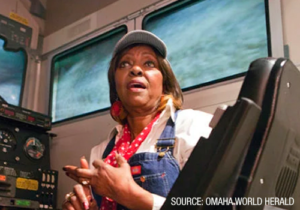
Black History Month is celebrated every year, appreciating the achievements by African Americans and recognizing their central role in U.S. history. Every year during Black History Month, we celebrate and appreciate achievements by African Americans, and the central role they’ve played in U.S. history. Since 1976, every U.S. president has officially designated the month of February as Black History Month[1].
Greenbrier recognizes and thanks the following African American advocates, innovators and visionaries in the surface transportation industry.
Edwina Justus[2]
July 11, 1943
Edwina Justus is the first African American female locomotive engineer for the Union Pacific Railroad. In the 1970’s she was hired at Union Pacific as a Traction Motor Clerk and was one of five black women who worked in the Omaha office. “As a Traction Motor Clerk, Justus monitored the condition of the traction engines and attended a workshop to learn about the locomotive engines. Upon hearing of a new position opening for a train engineer while at the workshop, she readily applied,” (Brumbaugh, 2021).
She was selected for the engineering position, which required moving to North Platte, Nebraska. Justus experienced racism and sexism inside and outside the workplace. At the time, North Platte, Nebraska had 22,000+ residents, only 79 of whom were African American. Despite these challenges, Justus remained dedicated to her locomotive engineering position, and acquired increasing responsibilities over the duration of her career with the railroad. She is now retired and still lives in Nebraska.
Learn more:
William T. Coleman, Jr.
July 7, 1920 – March 31, 2017
William Coleman, Jr. was the first African American Secretary of Transportation, appointed by President Gerald Ford. He was also the second-ever African American to be named to any cabinet position. Among his many contributions such as co-authoring the legal brief for Brown vs. education, Coleman was a visionary in the American transportation industry. He issued the Department of Transportation’s first official national transportation policy statement and formed the Materials Transportation Bureau to oversee programs for pipeline safety and the shipment of hazardous materials. President Bill Clinton awarded him the Presidential Medal of Freedom in 1995.
After his service with the DOT, Coleman collaborated with Greenbrier on several essential issues affecting the railroad industry. Today, Greenbrier continues to reap the benefits of the partnership with Coleman.
Learn more:
Frederick McKinley Jones[3]
May 17, 1893 – February 21, 1961
Frederick Jones was an American entrepreneur, inventor and winner of the National Medal of Technology. In his lifetime, he patented more than 60 inventions, 40 of which were related to refrigeration.
In 1935, he invented the first automatic refrigeration system for long-haul trucks and railcars. This device was used during World War II to preserve food and medicine over long-distance transport.
This invention led to Jones becoming a co-founder of Thermo King Corporation, which revolutionized the way people consume food and drinks today. Among other things, the refrigeration units allow people to eat fresh produce year-round.
Thermo King still provides a range of refrigeration products for the railroad and trucking industries. In fact, Greenbrier uses Thermo King’s cooling systems to keep its refrigerated boxcars chilled!
Learn more:
Minnesota Science & Technology Hall of Fame
ELIJAH MCCOY[4]
May 2, 1844 – October 10, 1929
Canadian-born Elijah McCoy was an inventor responsible for more than 57 patents.
His parents escaped slavery through The Underground Railroad and sent their son to Scotland to train as an engineer. When he returned to the United States, he struggled to find a position in this field due to racial barriers, until he was hired by Michigan Central Railroad.
One of his most crucial inventions was the automatic engine lubricator, which saved trains from having to stop every few miles to have their moving parts oiled.
The device became so popular, it was copied with diminished success, leading railroads to demand “the real McCoy” for their engines.
LEWIS LATIMER[5]
September 4, 1848 – December 11, 1928
Lewis Latimer co-patented an improved toilet system for railcars called the Water Closet for Railroad Cars.
The invention protected passengers from dust and debris that was kicked up from the tracks while people used the restroom during their ride.
In 1874, Latimer was hired by Alexander Graham Bell to draft the necessary drawings for patenting the first telephone.
ANDREW JACKSON BEARD[6]
1849 – May 10, 1921
Andrew Jackson Beard patented several railcar coupler inventions between 1887 and 1905. He invented the Jenny Coupler, the precursor to what we now call the “Janney Coupler.”
The Jenny Coupler allowed railcars to be connected and disconnected remotely, meaning employees would no longer have to take the risk of standing between railcars to couple and uncouple them. The invention came at a cost, as Beard lost a leg trying to couple a pair of railcars.
In 1893, Congress made it illegal to operate railcars that were not equipped with automatic couplers. Beard formed his own business, the Beard Automatic Coupler Company, which he later sold for $50,000. His royalties from his various patents that made him the first black millionaire in Jefferson Co. Alabama.
His career as an inventor earned him a spot in the National Inventors Hall of Fame in 2006.
GRANVILLE WOODS[7]
April 23, 1856 – January 30, 1910
Granville Woods was a prolific inventor, railroad firefighter and locomotive engineer.
In 1887, he invented a telegraph system that allowed trains and towers to communicate. In 1888, Woods invented overhead electric conducting lines, which are now known as catenary wires.
From 1902 to 1905, he patented a handful of improvements to existing brake systems used by trains.
[1] https://www.history.com/topics/black-history/black-history-month
[2] Brumbaugh, M. (2021, April 13). Edwina “Curlie” Justus (1943- ). BlackPast.org. https://www.blackpast.org/african-american-history/people-african-american-history/edwina-curlie-justus-1943/
[3] https://aaregistry.org/story/frederick-mckinley-jones-innovator-of-many-devices/
[4] https://www.up.com/customers/track-record/tr2221-black-railroad-inventors.htm
[5] Union Pacific, 2021
[6] Union Pacific, 2021
[7] Union Pacific, 2021

